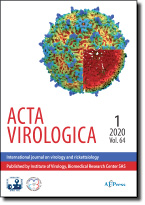Journal info
|
||
Select Journal
Journals
Bratislava Medical Journal Ekologia - Ecology Endocrine Regulations General Physiology and Biophysics Neoplasma Acta Virologica Current articles 2023 2022 2021 2020 2019 2018 2017 2016 2015 2014 2013 2012 2011 2010 2009 2008 2007 2006 2005 2004 2003 Studia Psychologica Cardiology Letters Psychológia a patopsych. dieťaťa Kovove Materialy-Metallic Materials Slovenská hudba 2025Webshop Cart
Your Cart is currently empty.
Info: Your browser does not accept cookies. To put products into your cart and purchase them you need to enable cookies.
Acta Virologica Vol.62, No.3, p.259-265, 2018 |
||
| Title: Drug resistance-associated mutations in antiretroviral treatment-naïve and -experienced patients in Kuwait | ||
| Author: W. CHEHADEH, O. ALBAKSAMI, S. E. JOHN, W. AL-NAKIB | ||
| Abstract: The identification of human immunodeficiency virus (HIV) mutations leading to drug resistance enables patient-specific adaptation of the treatment regimen and predicts the risk of transmission of drug-resistant HIV. In this study, we report for the first time the prevalence in Kuwait of non-polymorphic resistance-associated mutations (RAMs) in patients under first-line antiretroviral therapy. Viral RNA was extracted from plasma samples of 64 treatment-naïve (untreated) and 64 treatment-experienced patients. The HIV-1 load was determined by real-time RT-PCR. The protease- and reverse transcriptase-encoding regions were analyzed by subtyping, and for drug resistance. The HIV-1 load at sampling in treatment-naïve patients ranged from 1.61 x 104 to 1.91 x 106 copies/ml, whereas that in treatment-experienced patients ranged from bitors (PIs) and NNRTIs. These results necessitate efforts to be made for reducing emergence of resistance-associated mutations in treated patients, and highlight the need for continuous monitoring of drug resistance patterns in Kuwait. |
||
| Keywords: HIV-1; genotyping; mutations; drug resistance; surveillance; Kuwait | ||
| Published online: 30-Aug-2018 | ||
| Year: 2018, Volume: 62, Issue: 3 | Page From: 259, Page To: 265 | |
| doi:10.4149/av_2018_219 |
||
|
|
 download file download file |
|

